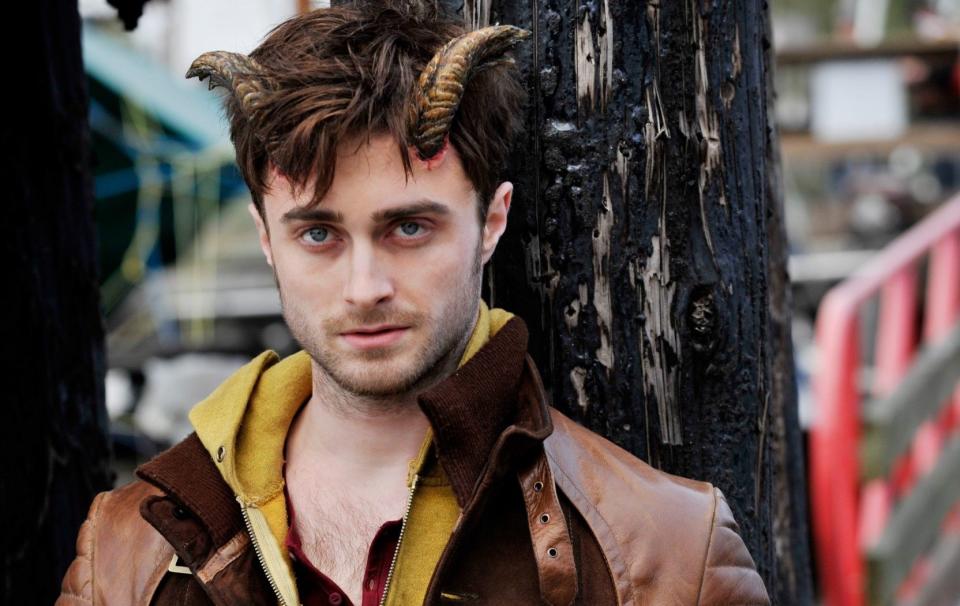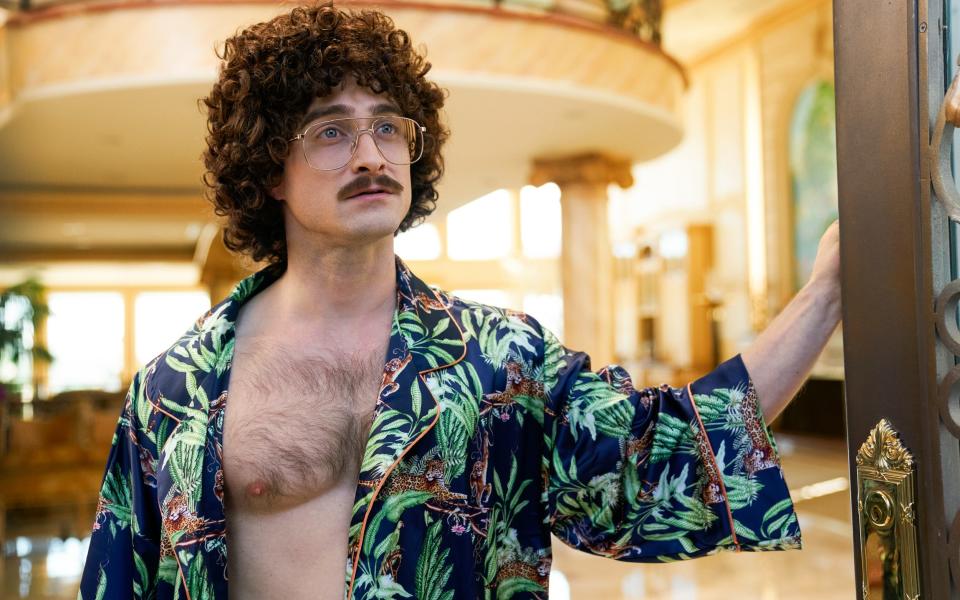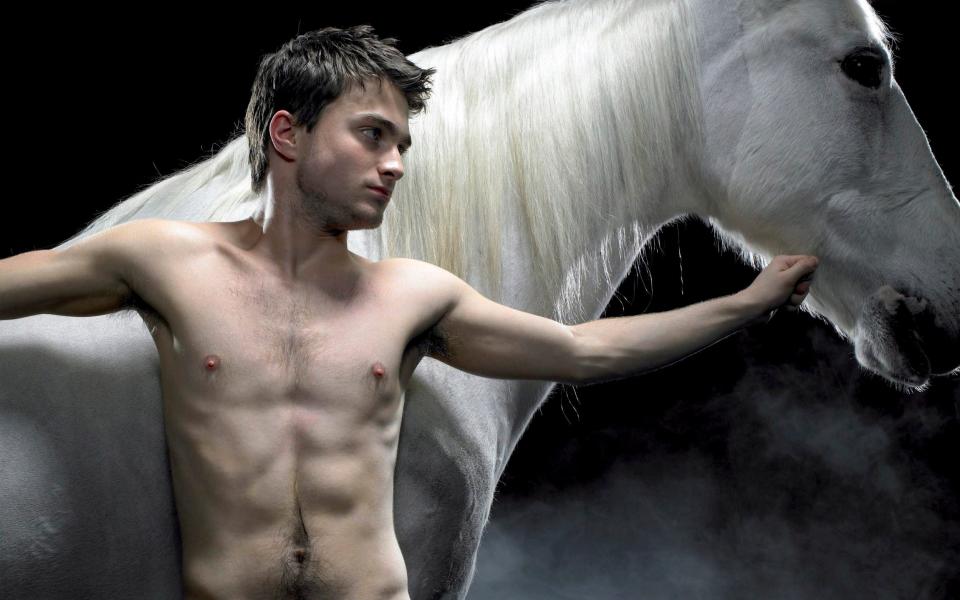Hollywood loves a redemption story, and on Sunday night we got two for the price of one. Daniel Radcliffe finally received the critical acclaim to match his outsized Potter fame, winning his first Tony Award for his supporting role in Stephen Sondheim’s musical Merrily We Roll Along, while this critically acclaimed Broadway production – which earned three more Tonys, including Best Revival – made a belated hit on Sondheim’s infamous 1981 flop.
While this is undoubtedly a group victory for British actress and director Maria Friedman and her leading actors – Jonathan Groff (also a Tony winner for the show) and Lindsay Mendez – it should be especially encouraging for the former Boy Wizard. He’s not exactly drowning in praise for his acting talents – neither for the Potter films, which mostly saw him staring at unseen special effects, nor in the years since, despite a fascinatingly eclectic choice of projects.
However, the actor recently scored his first Bafta and Emmy nominations for his portrayal of musical comedian Weird Al Yankovic, and he has now surpassed that with his Tony win. Have we misjudged his capabilities in the past? Or has The Boy Who Couldn’t Act been transformed into a legitimate stage actor, resulting in a Radcliffaissance?
It seems harsh to look critically at the efforts of a twelve-year-old – and yet we all did when the first Harry Potter film hit theaters in 2001. Radcliffe was good looking (though that was mostly down to the scar and specs), he had a camera-ready smile and a good – if overused – line of wide-eyed wonder, but he wasn’t exactly Daniel Day- Lewis. Even Radcliffe admitted this when looking back on his youthful efforts, saying, “I don’t think what I did in the first two films could really be called acting”.
In their defense, these lumbering franchises are rarely known for their subtle performances. Alan Rickman is a great Snape, but he flies around the Great Hall of Hogwarts like an angry bat, while even the indomitable Maggie Smith starts to check out halfway through the series. That’s because much of the director’s energy is focused on the bigger picture (millions of pounds): rounding up the thousands of children’s extras, or imagining the carnage caused by a rampaging troll.
Nevertheless, Radcliffe’s performance improves on the Potter films and gains nuance and emotional weight by the fourth film, Goblet of Fire. I especially love the scene in the penultimate episode where he and Emma Watson’s Hermione share a brief respite from the gloom by dancing to a song on the radio. It’s loose, spontaneous and affectionate, and Radcliffe – for once – seems completely confident in his choices. Maybe it was by osmosis – it would be hard to share scenes with the likes of Rickman, Smith and Gary Oldman without noticing something strange.
We also now know that Radcliffe was struggling with the pressure of this sudden fame at the time – which in turn fueled his alcohol problems. He could just as easily have followed the same path as child stars like Lindsay Lohan, Amanda Bynes or Macaulay Culkin.
Instead, Radcliffe came to grips with his sobriety and then used his newfound wealth and A-lister status to greenlight some truly bizarre projects. He was a murder suspect who grew horns in the 2013 film Horns, the 2015 hunchback Igor who misfired Victor Frankenstein, and, infamously, a farting corpse in the 2016 film Swiss Army Man. Radcliffe also had a soft spot for a rom-com ( What If), a survival drama (Jungle) and a ridiculous, ultra-violent crime film (Guns Akimbo).
None of these really made the case for him as a mature star, someone who could emulate his early Potter success – and also outgrow the association. (Something he seems eager to do, given his recent conflicts with author JK Rowling over trans issues.)

But I would say this is because Potter put Radcliffe in the wrong corner. Outside of Hogwarts, he’s never really seemed like a proper Hollywood leading man – he’s neither a brawny Marvel hero, nor brimming with pyrotechnic charisma or Timothée Chalamet-esque pouting sexuality. He’s actually a curious and increasingly interesting character actor. He’s not afraid to take risks (that Wizard’s financial cushion helps), and he’ll definitely get more of these roles that really suit him as he gets older.
Radcliffe has already gained a certain level of respect with his somewhat eccentric approach, lending support to experimental filmmakers just by adding his box office-friendly name. He then received some of the best reviews of his career for playing Weird Al Yankovic (famous for his parody songs like My Bologna instead of My Sharona) in the 2022 biopic. The New York Times praised him for lip-syncing “with so a dedication that almost bursts his neck veins.’ Tim Robey of The Telegraph commented that Radcliffe was “clearly having the time of his life.”


He’s the kind of actor whose efforts you notice and often admire – a quality that endears you far more to theater audiences than to cinema audiences.
Radcliffe’s first major role after the franchise was in Peter Shaffer’s play Equus, in the West End and then on Broadway, where he starred opposite his Potter co-star Richard Griffiths. Although much of the conversation was taken up by the fact that 17-year-old Radcliffe had a nude scene, there was also admiration for his committed performance as a deeply troubled boy. Charles Spencer of The Telegraph praised the way Radcliffe “keeps the emotion on a dime, switching from sullen anger to raw vulnerability, or from terrible pain to sudden childlike innocence and charm.”
Radcliffe took another big risk by starring in the 2011 Broadway musical How to Succeed in Business Without Trying Again, in which he tackled big song and dance numbers. Reviewers weren’t entirely convinced (there was more praise for his playing efforts, with one calling him an “honest to good trouper” than his musical talents), but once again the stage allowed him to experiment and grow. Theater loves a try-hard.


He has also returned to the London stage, opting for challenging modern classics such as Martin McDonagh’s 2013 The Cripple of Inishmaan, in which Spencer praised Radcliffe’s “touching stoicism and simplicity… all the more moving because it is so understated”. 2017 also saw Tom Stoppard’s Rosencrantz and Guildenstern Are Dead, in which its “schoolboyish eagerness” earned a nod of approval from the Telegraph’s Dominic Cavendish. However, it was that cheerfulness of youth that deserted him in Samuel Beckett’s Endgame in 2020, where he played the decrepit Clov.
Yet that gonzo strategy paid off with Merrily We Roll Along, the backward-rolling Sondheim musical about three artistic friends and how their relationships change over the course of twenty years.
Radcliffe plays idealistic playwright Charley, who becomes embittered when his composer partner Frank sells out. All his grudges come out in the fast-paced banter song Franklin Shepard, Inc. – which Radcliffe is absolutely good at. He probably drew from his lifelong rap fandom; you can watch his quite excellent version of Alphabet Aerobics on YouTube.
It’s hard to say whether this is truly a defining moment for Radcliffe as an actor, or the happy culmination of a role that suits him, and castmates (Groff and Mendez) who have become close friends in real life, making the entire production has become a winning one. authenticity. Radcliffe has also spoken about how growing older has shaped his emotional response to the role, and poignant lyrics such as in the song Our Time: “It’s our time / Breathe it in / Worlds to change, and worlds to win.”
He has endeared himself immensely to the Broadway community by giving Sondheim’s failed show this dreamy redemption arc. Its Potter fame made it a huge commercial success, and this brilliant company – of which Radcliffe was a vital member – ensured that this complex musical connected with audiences in a way never before seen.
Is it Radcliffe’s time now? I’d say it: the Boy Wizard is finally making acting magic.